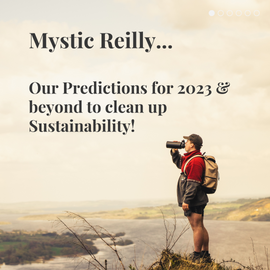Depending on who you are, your morals, your values, your ethics, nationality and view on the world, climate change can mean a variety of different things to you.
It can make you feel a variety of different ways. However, we must be able to understand the science and the impacts at a basic level to help us, help ourselves and others across the world.
While the area of climate change and sustainability is huge and leads to a variety of different risks across the world, with a variety of solutions for each, here are some of the main topics to consider in terms of your own life to make an impact in less than five minutes:
Climate change is caused by human activities that release greenhouse gases into the atmosphere, which has dramatically increased since the industrial revolution. The burning of fossil fuels for energy, such as coal, oil, and natural gas, is the leading contributor to these emissions.
Deforestation, industrial processes, and agricultural practices for the likes of Meat & Soy cultivation also contribute to greenhouse gas emissions. According to the Intergovernmental Panel on Climate Change (IPCC), human activities have caused a global temperature increase of approximately 1.2 degree Celsius since pre-industrial times which leads to a variety of impacts across the world, impacting different regions, in different ways.
Climate change can have many impacts, such as rising global temperatures, melting glaciers, rising sea levels and more devestating and adverse weather events.
These impacts can affect the environment, wildlife, human health, and the economy individually or all at once. For example, if one country suffers from drought, it can lead to a lack of agriculture and food, which can then lead to mass migration, health issues or even wars.
One major concern is the existence of tipping points, which are critical thresholds beyond which abrupt and irreversible changes can occur. For example, the melting of the Greenland and West Antarctic ice sheets could lead to a significant rise in sea levels, threatening coastal regions worldwide including New York, Miami and Shanghai. Other tipping points include the disruption of ocean currents, the release of large amounts of methane from thawing permafrost, and the collapse of ecosystems. These tipping points have the potential to amplify the impacts of climate change and make it even more difficult to mitigate as they all support the damnation of the other.
Solutions to climate change
To address climate change, it is important to reduce greenhouse gas emissions and support adaptation and resilience efforts. Some of the main solutions to climate change include transitioning to renewable energy, protecting and restoring forests, and reducing consumption and waste.
Addressing climate change requires a multi-faceted approach that involves all major industries. The energy sector can transition from fossil fuels to renewable sources such as solar, wind, and hydropower. The transportation sector can adopt electric vehicles and invest in public transit systems.
Industries can improve energy efficiency, promote circular economy practices, and reduce waste. The agricultural sector can implement sustainable farming methods and reduce methane emissions from livestock.
Additionally, emerging technologies like hydrogen fuel cells and carbon capture and storage have the potential to play a crucial role in decarbonising various industries, especially the steel, cement and plastic industries which contribute to approx 30% of overall emissions.
Climate policy
Public policies and taxes play a vital role in addressing climate change by providing incentives, regulations, and frameworks for sustainable practices, as mostly dictated by the Paris Agreement since 2015. Governments should look to implement renewable energy targets, promote energy efficiency standards, and offer subsidies for clean technologies and businesses to assist with learning and development to drive new innovation and technologies to assist with the Net Zero transition. However, without international agreement, this can be tricky as all stakeholders are required to play their part and ensure cooperation and coordination.
Carbon pricing mechanisms, such as carbon taxes or cap-and-trade systems, can create economic incentives to reduce emissions as well, however these are widely debated with issues stemming from carbon trading and carbon offsetting industries whereby companies have been taking advantage of the schemes.
Overall, climate change is quite complex and the issue covers multiples areas and topics across all walks of life. There are so many topics to learn and understand but to effectively address climate change, it is important to have a deep understanding of its causes, impacts, solutions which we will continue to delve into in later weeks.
For now, if you have any specific queries or questions, please don't be shy to reach out and let me know!
Email: Cathal@Narcissips.com
Socials: @Narcissips
Sources:
- United Nations Framework Convention on Climate Change (UNFCCC), "The Paris Agreement" (https://unfccc.int/process-and-meetings/the-paris-agreement/the-paris-agreement)
- World Bank, "State and Trends of Carbon Pricing 2021" (https://openknowledge.worldbank.org/handle/10986/36325)
- United Nations Framework Convention on Climate Change (UNFCCC), "The Paris Agreement" (https://unfccc.int/process-and-meetings/the-paris-agreement/the-paris-agreement)
- International Renewable Energy Agency (IRENA), "Global Energy Transformation: A Roadmap to 2050" (https://www.irena.org/publications/2021/Apr/Global-Energy-Transformation-A-Roadmap-to-2050-2021Edition)
- World Resources Institute, "Creating a Sustainable Food Future" (https://www.wri.org/our-work/project/world-resources-report/sustainable-food-future)
- IPCC, "Climate Change 2021: Impacts, Adaptation, and Vulnerability" (https://www.ipcc.ch/report/ar6/wg2/)
- The Guardian, "Tipping points could cascade towards climate chaos, scientists fear" (https://www.theguardian.com/environment/2021/jun/30/tipping-points-could-cascade-towards-climate-chaos-scientists-fear)
- IPCC, "Climate Change 2021: The Physical Science Basis" (https://www.ipcc.ch/report/ar6/wg1/)
- NASA, "Causes of Climate Change" (https://climate.nasa.gov/causes/)




